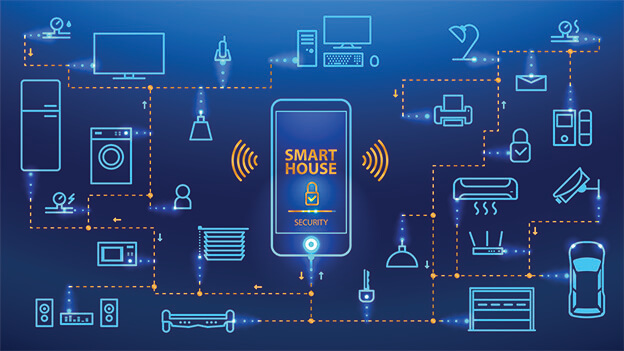Times have changed, and we have become increasingly dependent on machines for tasks. AI has changed how we work, and there is no sector which its influence has not touched. So what holds in the future for real estate as it emerges more resilient than before?
There is an undercurrent of radical transformations in this sector where technology is the leading catalyst. Real estate companies are integrating technology and sophisticated features to help homebuyers find their dream home. Fifteen years back, a virtual property walkthrough was unimaginable. But today, it is sufficient for investors and homebuyers to buy a property based on this technology. The state-of-the-art VR models also enhance the home-buying experience.
Such future trends look amazing for real estate and are shaping the brokerage industry. Let’s have a look:
Decentralized finance
Have you heard about decentralized finance or De-Fi? Most real estate investors want to safeguard their transactions and generate income. Technologies like Blockchain and Cryptocurrencies will transform real estate transactions.
Additionally, with tokenization, real estate brokers can streamline transactions. Tokenization divides properties into tokens, allowing easy investment and fractional ownership. Other than this, smart contracts will help secure property transactions, reducing the need for intermediaries.
Decentralized finance can streamline lending and borrowing and can simplify real estate transactions. By eliminating intermediaries – De-Fi real estate solutions enable direct contact between parties, ensuring transparency and fairness.
Virtual Reality Tours

According to a Goldman Sachs report, VR use in real estate will bring massive earnings of $ 2.6 billion. Virtual reality will become one of the most important real estate trends in the coming years.
With VR technology, real estate agents can help explore properties from any remote area. Additionally, with VR, you can enable clients to explore a virtual property walkthrough.
The best part is that it will save – both sellers and buyers money and time. Expect a high buyer demand for VR tours in the coming years. Using this technology – a real estate company can convert any space into a digital resource.
Hybrid real estate models
There is a difference in how online and traditional real estate services work. However, hybrid real estate models can blur this difference, offering the best of both worlds.
Like other sectors, a hybrid system has proven beneficial in real estate. If real estate investors and property developers meet halfway – it can save time and effort.
The real estate trend is here to stay because the hybrid model is the new normal. Based on the one realtor’s report, it is clear that real estate brokers will offer both virtual and in-person options to homebuyers or investors.
Smart homes

If you ask a millennial about their ideal dream home, you will probably hear about smart homes. And why not? With the integration of technology, smart homes can give you the comfort you seek – in life.
From automatic lighting to computerized lock systems, the smart homes concept is intriguing. Tech-driven and climate-conscious people are ready to pay extra for smart homes.
Real estate companies must be versed in smart home features, including IoT devices and security systems. Smart homes will help real estate brokers meet the expectations of tech-savvy buyers.
Affordable housing initiatives
The global affordable housing market is expected to grow by $ 84.7 billion by 2031. In India, the demand for affordable housing is increasing, and builders are tapping into opportunities to create such options.
The Indian government’s initiative of – Housing for All is an example of how things will change – in the future. The builders are focusing on affordable housing projects under the initiative.
Following this, there are simple financing options available for first-time homebuyers. The affordable housing trend will surely pick up with time as the market caters to the middle class in India. Moreover, it will undoubtedly impact the real estate market reach.
Integration with AI

Integration of AI in real estate can streamline property searches, automate property management, analyze the market, make pricing predictions, and enhance the efficiency of selling and buying a property.
Additionally, AI can help in advanced analytics and legal and regulatory compliance. The best feature is AI can facilitate accurate and timely monitoring of the property’s overall health.
Also, it can help to streamline content marketing and workflow automation. In real estate, NLP streamlines virtual assistance through virtual assistance and chatbots. It is a great bet when dealing with real estate investors who expect personalized and accurate responses.
Sustainable living spaces

Sustainable living is the new way of life. Today, homebuyers focus more on energy-efficient features and eco-friendly features. The demand for sustainable spaces is on the rise.
After some years, the real estate sector will undergo a massive transformation. As a result, developers will adopt green building practices such as rainwater harvesting, green roofs, solar panels, and zero-energy homes. The future of the real estate sector is eying sustainability, and it will shape the real estate sector.
Will real estate brokers remain in demand?
With the adoption of technology, things may change in the real estate sector. So the question is – what will happen to real estate brokers? Well, changing consumer habits takes time. Ideally, a first-time homebuyer will still trust a real estate broker for buying or selling a house.
For most home buyers, closing a deal with a real estate broker is much easier than adopting a different tech procedure. Despite the tech integration, real estate brokers will stay in demand. But, in the future, real estate brokers will have to remain agile to the demanding needs of homebuyers.
The future looks bright for real estate
Change is inevitable, and changing with time is essential. Real estate brokers should leverage technology to enhance the home-buying experience. Additionally, a client-centric approach with tailored services will make a difference in network building.
The real estate landscape is shifting fast, and you can expect many changes in the future. You can provide good services to potential clients by streamlining your processes with the technology. So, are you ready to embrace this change?
